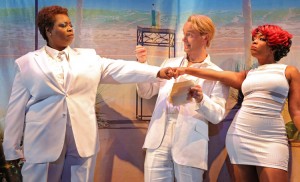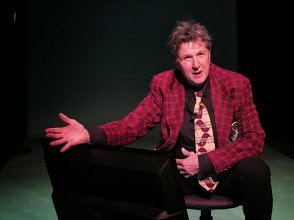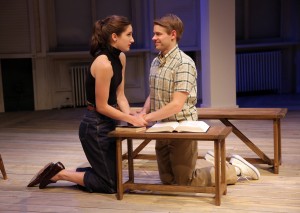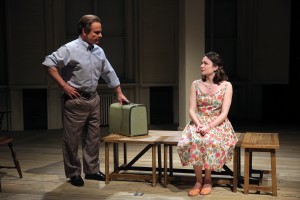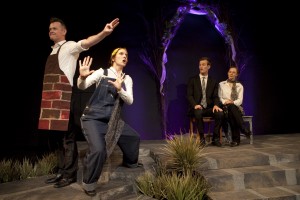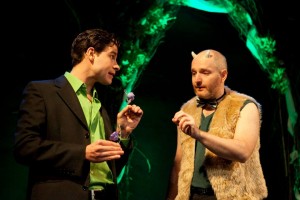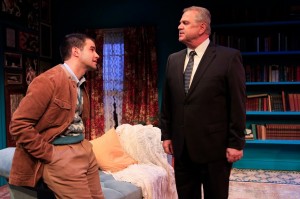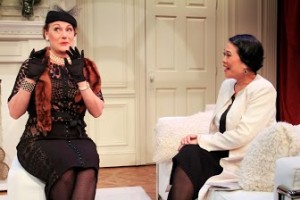The Mint Theater, upstairs in a loft building on West 43rd St., pursues forgotten plays with the vigor of a dachshund digging for moles. Over the course of 18 years, this dogged Company has unearthed a surprising number of theatrical treasures buried by time, as well as a few mislaid scripts (but only a few) of primarily academic interest. Since the Mint's founding, the professionalism of its productions has risen steadily. The company is now among the foremost nonprofit theaters in New York City. Next month an audience of unprecedented magnitude will see this accomplished group's work when London Wall by John Van Druten, presented on-stage at the Mint last spring, is telecast as the inaugural episode of Theater Close-Up, a weekly series hosted by Sigourney Weaver on New York public broadcasters WNET and WLIW.
While waiting for its television debut, the Mint has unveiled a top-flight production of The Fatal Weakness, a 1946 comedy by George Kelly, directed by Jesse Marchese. Last year, the satiric Philip Goes Forth, another Kelly revival at the Mint, was noteworthy for acting and design; the play itself proved more historically intriguing than dramatically satisfying. In The Fatal Weakness, sprightly, intelligent dialogue and engaging turns of plot overcome the liability of Kelly's sluggish, old-fashioned exposition. Even in its less engaging moments, The Fatal Weakness is an ideal vehicle for the Mint's two masters of high-comedy style, Kristin Griffith and Cynthia Darlow.
In the 1920s, Kelly graduated from vaudeville (for which he wrote popular sketches) to Broadway, where he won a Pulitzer Prize for Craig's Wife. Though frequently satiric and always concerned with the follies of the American middle and upper-middle classes, Kelly's plays are too varied to be summed up in a phrase. The Fatal Weakness is an urbane comedy of manners which was presented originally by The Theatre Guild in 1946 with the great comic actress Ina Claire in the leading role. It played 119 performances, a respectable Broadway run for a non-musical play in those days and sufficient to recoup the producers' investment. Kelly was 63 when the play closed; he survived another 27 years, but The Fatal Weakness was his last new work on Broadway. Except for a 1976 television adaptation, introduced by Kelly’s famous niece, Her Serene Highness Princess Grace of Monaco, The Fatal Weakness has hardly been seen since it closed on Broadway in 1947.
The heroine of The Fatal Weakness, Ollie Espenshade (Griffith), is the kind of mid-century matron who would have been susceptible to the happily-ever-after hype surrounding the nuptials of George Kelly's movie-star niece to Rainier III, Prince of Monaco. (That much-chronicled event took place less than a decade after the play's premiere.) Ollie's "fatal weakness" is a combination of sentimental heart and romantic imagination. After 28 years of marriage, she has discovered that husband Paul is having an affair with an osteopath (an off-stage character). As one might expect, Ollie is incensed. When her busybody friend Mabel Wentz (Darlow) procures details of Paul's clandestine activities, Ollie's fancy shifts into high gear; and, as Ollie's rose-tinted imagination transforms Paul and the osteopath into Abelard and Heloise, The Fatal Weakness barrels forward on an unexpected narrative route.
Griffith makes Ollie's extravagant unworldliness endearing and, for the most part, credible. Marchese has surrounded her with actors who have a knack for Kelly's kind of urbane, out-of-kilter comedy. In addition to Darlow (a consummate, poker-faced comedian), the cast includes Cliff Bemis as the wayward husband, Victoria Mack as the unsympathetic daughter, Penny, and Sean Patrick Hopkins as the bewildered son-in-law, Vernon. Patricia Kilgarriff wrings maximal humor from the role of a parlor maid whose purpose in the script is largely, perhaps exclusively, expository. Garbed in handsome costumes by Andrea Varga (including, most notably, lavish frocks and lounging attire for Griffith), the cast cavorts around a richly detailed drawing room, designed by Vicki R. Davis (with period-appropriate bric-a-brac and props provided by Joshua Yocom). The single stage set, which received a round of applause when the curtains first parted at a recent performance, features high reflective panels that ought to be distracting but, in fact, contribute a dazzling visual effect to the scenic design throughout the evening.
The Fatal Weakness belongs in the company of those distinctively American high comedies written between the World Wars by Kelly's contemporaries Philip Barry (The Philadelphia Story) and S.N. Behrman (No Time for Comedy). Kelly's plays have fallen out of sight to a degree that Barry's and Behrman's have not. With several more Kelly plays ripe for revival, the Mint may redress that situation in seasons to come. In the meantime, New York audiences are learning that there's more to George Kelly's story than that famous niece.
The Fatal Weakness was scheduled to play through Oct. 26 but has now been extended through November 2, 2014, at the Mint Theater Company (311 West 43rd St.). Running time is 2 hours and 20 minutes. Performances are 7 p.m. on Tuesday, Wednesday and Thursday; 8 p.m. on Friday and Saturday, and 2 p.m. on Saturday and Sunday. There is a special matinee at 2 p.m. on Oct. 15 and no performance on Oct. 14. Tickets are $55 and $27.50 and may be purchased at www.minttheater.org or by calling 866-811-4111.








